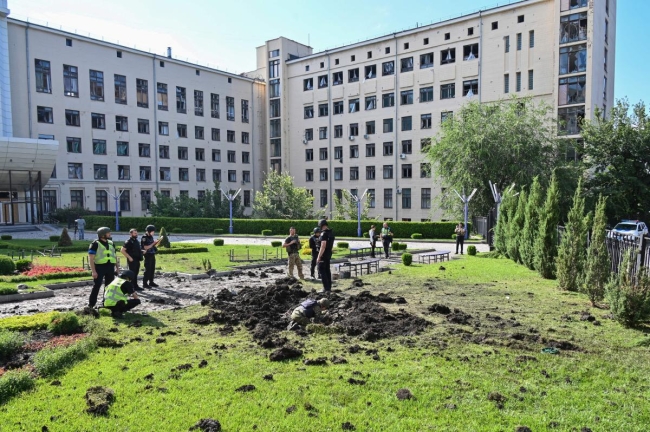You have /5 articles left.
Sign up for a free account or log in.

Police examine a crater caused by a shell explosion outside the National University of Urban Economy in Kharkiv, Ukraine on July 23.
Sergey Bobok/AFP via Getty Images
Russia's invasion of Ukraine has been devastating. More than five months into the war, tens of thousands of civilians and soldiers have died. Numerous Ukrainian cities and villages have been destroyed, and economic experts estimate it will take hundreds of billions of dollars to rebuild the country. Despite this destruction, the war continues without an end.
When the Russian incursion began, the international community quickly provided Ukraine with financial, humanitarian and defense aid. There have also been discussions on how the globe can assist Ukraine with its restoration efforts. Referred to as a "Marshall Plan for Ukraine," this future program would aim to rebuild the country's infrastructure and improve its economy.
Some of this aid should also be directed toward Ukraine's education sector. Before the war, Ukraine had one of the world's most educated and literate populations. This is because the Ukrainian government spent a significant portion of its GDP on its education sector. According to the Ukrainian government, 70 percent of its population has secondary or higher education. Ukraine's education system heavily focuses on the science, technology, engineering and math disciplines. As a result, Ukraine has some of the world's best engineers, computer scientists and information technicians.
But this educated population is threatened by the ongoing Russian invasion, and the war will impact an entire generation of students. Millions of Ukrainians have fled the country; according to the United Nations, more than six million Ukrainians are recorded as refugees across Europe. Another seven million are internally displaced. As these families seek refuge, education has become a secondary priority. Some young adult men have even abandoned their studies so that they could volunteer to defend their country.
Throughout the war, the Russians have targeted Ukrainian school buildings and cultural sites. This has put many Ukrainians in danger. As a result, many educational institutions have switched to remote forms of education. While Ukraine's Ministry of Education stated that a majority of the country's school-aged children are participating in online learning, this form of education has been complicated.
There are many challenges with this style of learning. First, an online environment requires families to have a stable internet connection and a home computer. In eastern and southern Ukraine, numerous apartment complexes, factories, buildings and electrical towers have been destroyed. Hundreds of thousands of Ukrainians have been left without electricity or gas. The destruction has made remote learning very difficult, but the alternative of attending school in person would put children and young adults in danger.
Meanwhile, millions of Ukrainian refugees will face new challenges as they seek to enroll in foreign academic institutions. Ukrainian students will have to adjust their styles of learning. They will also need to learn the languages of their host countries as it is unlikely their studies will be conducted in Ukrainian. This will require time, and it will put them further behind in their academic programs.
To add to these stresses, these Ukrainians will face financial complications. Many Ukrainian refugees fled their homes without their personal belongings, meaning they will not have the supplies and tools needed for their studies. In addition, some of these families cannot afford to send their children to these foreign schools and universities as they are expensive (although many schools, colleges and universities now offer generous stipends for Ukrainian refugees). These financial constraints would prevent Ukrainians from continuing their education.
There is also the possibility of a Ukrainian brain drain. As the Russian invasion continues, it is unlikely that Ukrainian refugees will want to return to the war-torn regions of southern and eastern Ukraine (nor should they). Instead, they will likely choose to assimilate into these foreign countries. Ukraine would then lose a significant portion of its future workforce, hampering its prospects for future economic growth.
In the immediate term, Ukraine is facing an economic crisis. The World Bank estimates that the country's economy will shrink by 45 percent this year due to the ongoing Russian invasion. As the war continues, the Ukrainian government has had to divert its resources to defense efforts.
As the international community considers future restoration efforts for Ukraine, it must give aid to the education sector. Providing safe learning areas for Ukrainian children and young adults will allow them to continue their studies. Sending financial assistance to Ukraine will also give it the resources it needs to rebuild its academic institutions and provide a quality education to its citizens. This, in turn, would lead to the development of a new generation of educated Ukrainian students who will use their knowledge and expertise to help rebuild their homeland. The possibilities of a brighter and better future for Ukraine would then be endless.




